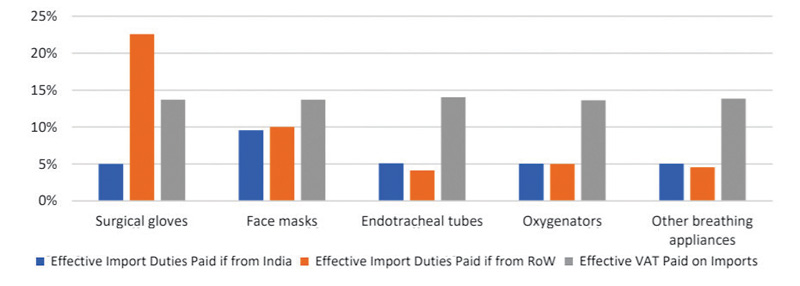WB recommends zero tariff on medical goods to fight coronavirus threat
Kathmandu, March 17
The World Bank has recommended that the government temporarily waive all taxes on imports of goods used in prevention and treatment of coronavirus disease, which has killed over 7,000 people and infected close to 174,000 people in 152 countries.
A revision in the country’s trade policy in view of the COVID-19 pandemic would make products, such as face masks, surgical gloves, endotracheal tubes, oxygenators and other breathing devices, cheaper, helping Nepal better fight the possible coronavirus outbreak, according to the Washington, DC-based multilateral lender.

“This was one of the ideas that we shared after the government sought our advice on containing the possible spread of the disease,” World Bank Country Manager Faris Hadad-Zervos told The Himalayan Times, adding, “The bank has a $29-million project for Nepal [in the pipeline] to tackle immediate medical needs in case of a coronavirus outbreak. The project would be approved by the board of directors within a couple of months.”
Nepal is so far safe from coronavirus disease, which has been declared a pandemic by the World Health Organisation. A Wuhan-returnee, who tested positive for COVID-19 about two months ago, has since recovered and about 500 other people, who have undergone coronavirus tests, have been given clean chits. To keep the country safe, the government has stopped issuing on-arrival visas to foreign travellers, reduced Nepal-India border-crossing movements, and made 14- day self-quarantine mandatory for Nepalis, non-resident Nepalis and foreigners entering Nepal from abroad.
Yet, fears of an outbreak have gripped Nepal, eliciting speculations of a complete breakdown of the country’s health system in case of a sudden jump in positive cases as in Iran and Italy.
These fears are not unfounded, as Nepal ranks 111th among 195 countries in the Global Health Security Index developed by The Economist Intelligence Unit in cooperation with the Nuclear Threat Initiative and the Johns Hopkins Centre for Health Security.
“Overt measures to prevent and treat health hazards, emanating from diseases like COVID-19, can be nudged along by unconventional interventions, from faith-inspired behaviour change to tariff reductions that moderate scarcity prices. Policymaking needs to be creative and adaptive in crises,” said Swarnim Wagle, former vice-chairperson of the National Planning Commission and former senior economist of the World Bank.
The World Bank has initially recommended that duties and VAT on import of face masks, surgical gloves, endotracheal tubes, oxygenators and other breathing devices be reduced to zero.
The government currently imposes import duty of up to 22 per cent on these goods. Face masks, for example, are subject to 10 per cent import duty, while import tariff on surgical gloves brought in from countries other than India stands at 22 per cent. On top of these, a VAT of 13 per cent is also levied.
These taxes helped Nepal generate revenue of $2.4 million — including $647,000 in import duty and $1.7 million in VAT — from import of these five products in the last fiscal year.
Temporarily reducing import duties and value-added tax to zero for emergency health equipment could have substantial effects on lowering domestic prices at reduced fiscal costs, the bank has advised.
Nepal has started producing more of face masks and may even start manufacturing surgical gloves in the wake of coronavirus threat.
But domestic production of these items may not be sufficient to cater to the growing demand in case of a crisis.
And there is no possibility of Nepal manufacturing oxygenators and other breathing equipment in the short run. It is well known that the most common treatment in severe cases of coronavirus infection is supplemental oxygen through mechanical ventilation.
If trade policy, which plays a key role in reducing prices, is revised, it would ensure availability of necessary medical equipment and household items that can help prevent the spread of the virus and deal with the consequences in case of a sudden jump in cases, the World Bank has said.
Meanwhile, Finance Secretary Sishir Kumar Dhungana said that while the government was mulling over removing tariffs on medical goods, nothing has been decided yet.






